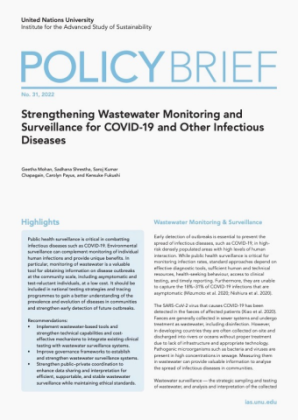A new UNU-IAS Policy Brief offers recommendations for scaling up wastewater surveillance as a cost-effective strategy for early detection and monitoring of infectious diseases. Focusing on low- and middle-income countries, it identifies the main challenges and opportunities for integrating wastewater surveillance systems into national and regional disease surveillance frameworks. The brief, Strengthening Wastewater Monitoring and Surveillance for COVID-19 and Other Infectious Diseases, is authored by Geetha Mohan, Sadhana Shrestha, Saroj Kumar Chapagain, Carolyn Payus, and Kensuke Fukushi.
Highlights
Public health surveillance is critical in combatting infectious diseases such as COVID-19. Environmental surveillance can complement monitoring of individual human infections and provide unique benefits. In particular, monitoring of wastewater is a valuable tool for obtaining information on disease outbreaks at the community scale, including asymptomatic and test-reluctant individuals, at a low cost. It should be included in national testing strategies and tracing programmes to gain a better understanding of the prevalence and evolution of diseases in communities and strengthen early detection of future outbreaks.
Recommendations:
- Implement wastewater-based tools and strengthen technical capabilities and cost-effective mechanisms to integrate existing clinical testing with wastewater surveillance systems.
- Improve governance frameworks to establish and strengthen wastewater surveillance systems.
- Strengthen public–private coordination to enhance data sharing and interpretation for efficient, supportable, and stable wastewater surveillance while maintaining ethical standards.

